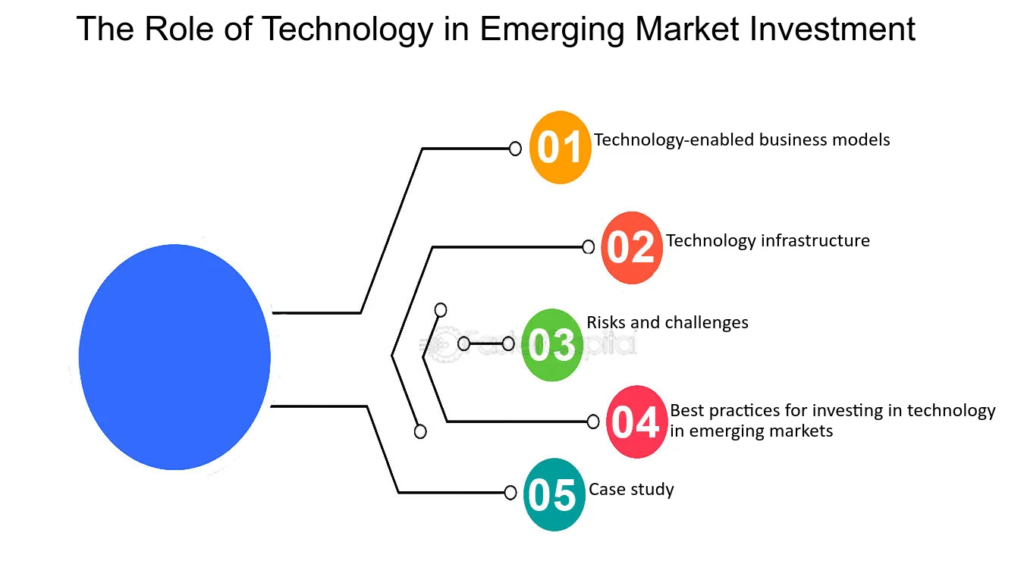Introduction
Investing in emerging markets can offer lucrative growth opportunities for investors seeking to diversify their portfolios and capitalize on the potential of developing economies. From Asia and Latin America to Africa and the Middle East, emerging markets encompass a wide range of countries with dynamic growth prospects. In this guide, we’ll explore the top 5 ways to invest in emerging markets and unlock the potential for long-term wealth creation.
Top 5 Ways to Invest in Emerging Markets
1. Invest in Emerging Market Equities
One of the most direct ways to gain exposure to emerging markets is by investing in equities of companies based in these regions. Emerging market equities offer the potential for high returns, but they also come with higher volatility and risk. Investors can choose to invest in individual stocks of companies listed on emerging market exchanges or opt for diversified mutual funds or exchange-traded funds (ETFs) that focus on emerging market equities. By carefully selecting quality companies with strong fundamentals and growth potential, investors can capture the upside of emerging market growth while managing risk through diversification.

2. Consider Emerging Market Mutual Funds
Emerging market mutual funds provide investors with a convenient way to gain exposure to a diversified portfolio of stocks from emerging market countries. These funds are managed by professional fund managers who specialize in selecting and managing investments in emerging markets. By investing in a mutual fund, investors can benefit from the expertise of seasoned fund managers and access a diversified portfolio of emerging market securities across different sectors and regions. Mutual funds offer flexibility and liquidity, making them suitable for both retail and institutional investors looking to diversify their portfolios.

3. Explore Emerging Market ETFs
Exchange-traded funds (ETFs) are another popular vehicle for investing in emerging markets. Emerging market ETFs track specific indices or benchmarks composed of stocks from emerging market countries. ETFs offer several advantages, including low costs, intraday trading liquidity, and transparency. Investors can choose from a wide range of emerging market ETFs that cover different regions, sectors, and investment strategies. Whether you’re looking for broad exposure to emerging markets or targeted exposure to specific countries or industries, there’s likely an ETF that fits your investment objectives.

4. Direct Investments in Emerging Market Companies
For more adventurous investors willing to take on higher risk, direct investments in emerging market companies can offer the potential for significant returns. Direct investments may include private equity, venture capital, or direct stock purchases in privately-held or publicly-traded companies based in emerging market countries. While direct investments can be lucrative, they also require thorough due diligence, local market expertise, and a higher tolerance for risk. Investors should carefully assess the political, economic, and regulatory environment of the target country before making direct investments.

5. Explore Emerging Market Bonds
Investing in emerging market bonds can provide investors with exposure to fixed-income securities issued by governments or corporations in emerging market countries. Emerging market bonds offer higher yields compared to developed market bonds, reflecting the higher risk associated with investing in developing economies. Investors can choose from sovereign bonds issued by governments or corporate bonds issued by companies in emerging market countries. While emerging market bonds can enhance portfolio diversification and generate attractive returns, they also carry risks such as currency volatility, credit risk, and political instability.

Investing in Emerging Markets: FAQs
Are emerging markets a good investment opportunity?
Emerging markets can offer attractive investment opportunities for investors seeking growth and diversification. While they come with higher risk and volatility compared to developed markets, emerging markets also offer the potential for higher returns over the long term. Investors should carefully assess their risk tolerance and investment objectives before investing in emerging markets.
How can I mitigate risks when investing in emerging markets?
To mitigate risks when investing in emerging markets, investors should diversify their portfolios across different asset classes, regions, and investment strategies. They should also conduct thorough due diligence, seek professional advice when necessary, and stay informed about geopolitical, economic, and regulatory developments that may impact emerging market investments.
What are the key factors to consider before investing in emerging markets? Before investing in emerging markets, investors should consider factors such as economic growth prospects, political stability, regulatory environment, currency risk, inflation rates, and liquidity conditions. They should also assess the specific risks associated with individual countries or regions and tailor their investment strategies accordingly.
Are there any specific sectors or industries in emerging markets that offer promising investment opportunities?
Emerging markets offer opportunities across a wide range of sectors and industries, including technology, consumer goods, healthcare, financial services, and infrastructure. Investors should research and identify sectors that are poised for growth based on demographic trends, consumer behavior, technological innovation, and government policies in emerging market countries.
How should I allocate my portfolio to include investments in emerging markets?
The allocation to emerging markets in a portfolio will depend on factors such as investment objectives, risk tolerance, time horizon, and overall portfolio diversification. Financial advisors typically recommend allocating a portion of the portfolio, such as 5% to 20%, to emerging market investments, depending on individual circumstances.
Conclusion
Investing in emerging markets can be an exciting opportunity to tap into the growth potential of developing economies and diversify your investment portfolio. Whether you choose to invest in equities, mutual funds, ETFs, direct investments, or bonds, there are various ways to gain exposure to emerging markets and potentially generate attractive returns over the long term. By conducting thorough research, assessing risks, and staying disciplined in your investment approach, you can position yourself to capitalize on the growth opportunities offered by emerging markets.





